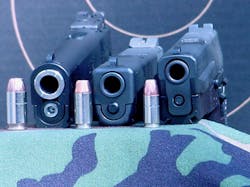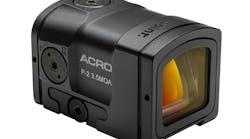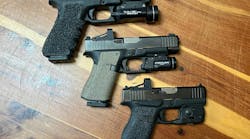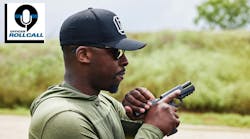As is true, I imagine, with most experienced gunners, I can count on getting a few questions from those who perceive me as more experienced with firearms than themselves. “What’s the best caliber?” That’s a good one. As if the argument about 9mm versus .45ACP hasn’t been raging for over a hundred years… only to have gotten more complicated with the addition of the .40S&W, 10mm, .357Sig, etc. (Assuming we’re talking only semi-auto calibers to begin with.) “What gun should I buy?” OR “What handgun do you recommend?” “What’s the perfect home defense gun?”
As my friend Dave Spaulding recently said, “Opinions are merely viewpoints based on life experience, formal education, task specific training, subject based encounters and the like. For this reason, opinions will vary and oftentimes are worth hearing. The question arises as to whether or not the opinion has VALUE.” I have another friend who often says, “And that’s my two cents worth. And it’s quite possibly not worth that.”
So, on the one hand, I feel complimented that anyone would ask my opinion and consider it of value. On the other hand, I know people whose opinion I consider of greater value than my own. They are easy to identify; they’re the people who don’t sound like they’re in a pulpit and they aren’t speaking in finite terms. They recognize that virtually everything is a matter of perception and what’s true for them just might not be true for everyone else – especially when it comes to something as personal as selecting a handgun for personal defense.
Most of the people I know who are “gun experts,” readily agree that there is far more than one “perfect” handgun for personal defense. The question is, which handgun is perfect FOR YOU. Toward that end I give the same answer when asked. The perfect handgun FOR YOU for personal defense is the one you are comfortable carrying and shooting, competent in handling and shooting, and confident in its ability to stop anticipated threats.
Now, let’s talk about those three qualifiers just a bit. Comfort is very subjective and what I find comfortable another shooter might not. Comfort in carrying varies depending on holster used, size and fitness levels of the person carrying it, mode of dress, and far more. I am not a fan of In-Waistband (IWB) carry, but a great many excellent shooters are. I haven’t carried a gun in a shoulder holster in over a decade, but I know plenty of people who prefer that mode of carry because of their physique, mode of dress and time spent in a vehicle.
Some folks just read that and thought, “Wait… time spent in a vehicle? What’s that got to do with it?” Well, think about it. If you’re sitting down all the time, seat-belted into a vehicle, do you really want to carry IWB just behind your right hip? Or On-Waistband (OWB) behind your right hip? How hard do you want that gun to be to get out and presented when you need it RIGHT NOW? So, yes – time in a vehicle counts in this decision and carrying in a shoulder holster makes the gun far easier to draw and present while seated. Cross-draw also works well for this purpose.
The weight of the weapon also impacts comfort. I absolutely love my Springfield Armory 1911 but it’s heavy. I use eight-round magazines and the 8+1 capacity is, I think, sufficient to most needs. I carry a spare magazine as well and feel as if 17 rounds ought to be enough to end “the fight.” Of course, I make assumptions about “the fight,” and base my opinion on that.
The overall size of the weapon impacts comfort as well. If you don’t believe me, put a full size 1911 handgun into a holster to carry IWB appendix position. Go ahead and sit down. Unless you have a long torso and less than 10% body fat, that slide/barrel is going to dig into you just above places you’d rather not have be uncomfortable.
The thing is – if you’re going to carry a gun for personal protection / defense, you have to carry the gun… always. So if it’s not comfortable, you probably won’t carry it. You’ll come up with excuses why you can’t or shouldn’t. Set that aside. Make sure the carry gun you select is comfortable to carry.
The gun should also be comfortable for you to shoot. Just because you CAN comfortably carry a snub-nosed .44Magnum doesn’t mean you should. Most of the time the recoil on such a weapon is going to make it near painful to shoot and that means you’ll flinch when you really should be focusing on your front site and applying even pressure to the trigger. Make sure the gun you pick out is comfortable for you to shoot; that you can manage the recoil; that it feels good in your hand. The gun should be comfortable to carry AND shoot.
That second item: Competence. Some people simply aren’t capable of shooting larger caliber weapons or even larger size but smaller caliber weapons well. Smaller hands, more delicate wrists (both men and women here), injuries, disabilities, etc. all impact the size of a weapon that you can shoot and become competent with. Recognize that “competent” doesn’t just mean you can shoot a bullseye course and keep the shots inside the 9-ring. Competence, in this case, means being able to manipulate the weapon (“run the gun”) under stress and time restrictions, while injured and experiencing malfunctions. That guy Murphy is always in your back pocket. If something can go wrong, it will at some point. Your level of competence has to be such that you can still accurately fire the weapon even while everything’s going to hell in a handbasket around you.
Finally, the last item: confidence. Many times the argument about “best caliber” revolves around things like “stopping power,” muzzle velocity, bullet weight, projectile design… and a bunch of other things that all ballistics experts love to discuss. Honestly, the arguments about caliber aren’t really so much about which is better as it is about sharing knowledge and differing viewpoints just so we can continue to grow our brains (at least that’s what I think sometimes).
But there is a reasonable expectation of performance that is attached to certain calibers. It seems only common sense that a .45 caliber bullet going 1,150 feet per second will inflict more damage than a .25 caliber bullet going the same speed (or slower). A bigger hole is, after all, a bigger hole and means more tissue damage, right? Yes. Does that mean that you should only be confident in larger caliber handguns? No.
You see, confidence isn’t just about the caliber and its ability to do damage. Confidence is also about YOUR ability to put rounds where they need to be (see competence above) and inflict the necessary damage to slow or stop the threat. I know a few prior service Navy SEALs that I’m pretty sure would be perfectly happy carrying a .380ACP. I also know some guys – who aren’t combat veterans in any way – who insist they need to carry a .45ACP handgun with a minimum of 12 rounds in a magazine… plus two spares, and a light mounted, and a reflex site, and and and… you get the point.
What’s YOUR confidence level with YOUR skill using YOUR handgun in YOUR selected caliber? For certain circumstances my personal defense carry gun is a Ruger LCP in .380ACP. For other circumstances my personal defense carry gun is a Springfield Armory 1911 in .45ACP. Lately, more often than not, my carry gun is a Glock Model 43 in 9mm. When I’m going up into the city (Washington DC) I tend to carry a gun with a few more rounds. That means carrying a bigger gun and having a harder time concealing it properly. When the circumstances change, so does my personal carry gun. When I’m driving long trips I tend to carry cross-draw and dress to conceal that.
Ultimately, as I said at the beginning: YOUR perfect choice for a personal defense pistol is the one you are comfortable and competent with, and confident in. Learn enough about weapons and try enough of them out to make such a selection for yourself.



